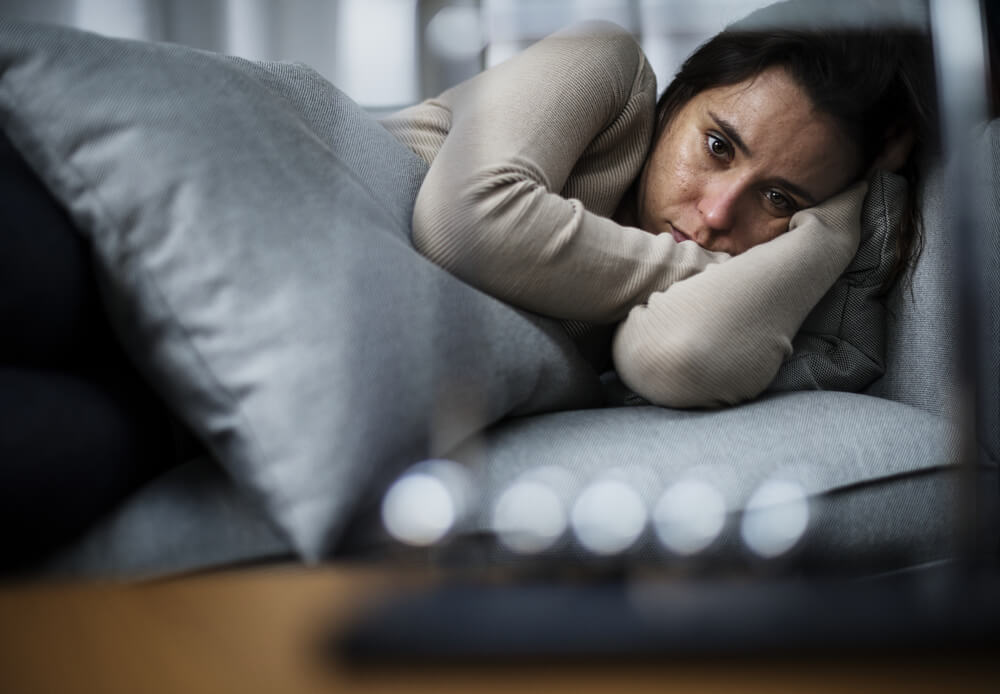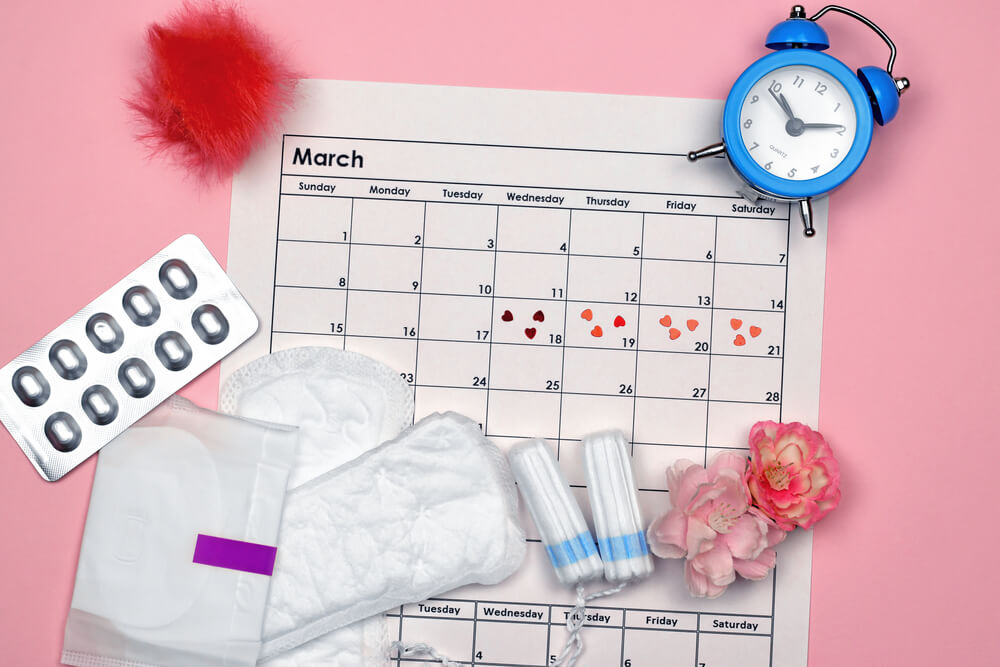As one of the main hormones in both the male and female body, estrogen levels can affect the proper functioning of the sexual and reproductive system. That’s not all, however, as it also has an important part in the workings of other systems in the body, such as skeletal, vascular, immune, neuroendocrine, etc. In women, hormonal and especially estrogen imbalance can lead to painful or irregular periods, abnormal light periods, and menopause discharge, among other symptoms. Both excessively high or overly low estrogen levels can cause a plethora of issues; later on, we’ll focus more on estrogen dominance and how to lower estrogen effectively. Different factors can trigger the imbalance, and it’s important to be aware of those in order to address the issue(s) properly.
Menstrual Cycle Issues
On average, a women’s menstrual period lasts anywhere between four and seven days. Furthermore, the typical length of the menstrual cycle is 21-35 days, with the period starting every 28 days. But, when something triggers the hormonal imbalance, these numbers can easily change drastically and fall into the category of abnormal, causing painful or irregular periods as well as other symptoms. For instance, the following occurrences describe clear menstrual issues:
- Having the period after less than 21 or more than 35 days from the last one
- Skipping three or more consecutive periods
- Experiencing either abnormal light periods or very heavy flows
- Having a period for more than seven days
- Suffering from untypically stronger pain during period, sometimes together with vomiting, nausea, and cramps
- Getting a menopause discharge, or bleeding/spotting after intercourse and/or between two periods
If you notice anything unusual with your menstrual cycle, be that the above-mentioned symptoms or something else entirely, make sure to book yourself an appointment with your OB/GYN. You can always count on the professionalism and expertise of PA Michelle Bigelman, who has years of experience with helping women enjoy optimal reproductive health, from adolescence to menopause.
Potential Causes of Painful or Irregular Periods

From an emotional response to everyday life such as stress to underlying health conditions, many factors that can affect the reproductive system. Many different reasons could trigger hormonal imbalance and, in turn, make the menstrual cycle and period irregular, painful, or otherwise problematic. However, the following ones tend to be the most common.
Side Effects of Missing Birth Control Pills
The main purpose of birth control pills is to prevent pregnancy. However, some women also get prescribed these for treating or managing certain conditions such as PCOS. Since they prevent ovaries from releasing eggs, the side effects of missing birth control pills can show relatively quickly, regardless of the matter of pregnancy. Namely, birth control usually contains either both estrogen and progestin or only progestin hormones. Therefore, the side effects of missing birth control pills once a woman completely goes off them can manifest in irregular periods, abnormal light periods, as well as skin changes such as acne.
Uterine Polyps and Fibroids
Uterine polyps and fibroids are benign tumors, the first one manifesting as uterine lining growth and the other as growth on the uterus wall. But even though they’re almost always noncancerous, these growths can cause painful periods and rather heavy flows.
Pelvic Inflammatory Disease (PID)
When bacteria enter the vagina, be that via sexual intercourse, childbirth, abortion, miscarriage, or GYN procedures, it can affect the entire female reproductive system, which causes the PID. Irregular periods are the most common symptom, but the infection is often accompanied by rather heavy discharge of bad odor, including menopause discharge, fever and nausea, painful sensations in the pelvic region, and even diarrhea or vomiting.
Endometriosis
The uterus lining consists of the endometrial tissue, and it’s this tissue that the female body expels during the period flow. But when this tissue starts growing outside the uterus and spreads to fallopian tubes or ovaries, it causes the condition called endometriosis. Women suffering from this condition often experience symptoms such as painful intercourse and PMS, and very heavy bleeding.
Polycystic Ovary Syndrome (PCOS)
PCOS occurs when ovaries produce too many male hormones. These hormonal changes can cause an imbalance that doesn’t allow timely egg maturation and regular ovulation. Consequently, irregular periods or missing the periods altogether can happen. What’s more, PCOS is linked to infertility, obesity, and hirsutism, which is why oral hormonal treatment and weight loss are often recommended.
Lifestyle and Stress
As it’s the case with health in general, lifestyle factors and stress can also affect the female reproductive system, and even more so than one may think. Excessive weight gain or loss together with other, more notable changes in everyday routine, can end up influencing a woman’s menstrual cycle.
Other potential causes of painful or irregular periods, as well as other menstrual cycle issues, include the following:
- Premature ovarian insufficiency
- Uterine or cervical cancers
- Blood-thinning meds and steroids
- Bleeding and thyroid gland disorders
- Difficult and complicated pregnancy, miscarriage included
How to Lower Estrogen?

Obviously, if you notice that there’s something wrong with your menstrual cycle and experience unusual symptoms for you personally, make sure to get a checkup with your doctor. However, it’s worth mentioning that leading a healthier and more active lifestyle is another answer to how to lower estrogen levels effectively, or at least balance the hormonal levels better.
Following certain diets can encourage your body to rebalance its hormonal levels while at the same time maintaining healthy body weight. Of course, age and the individual’s overall health are huge factors, but it’s definitely worth considering enriching your diet with plenty of fruits and veggies as well as whole, nutritious foods.
The following practices and diets can be very helpful in maintaining hormonal balance and getting your body to produce adequate amounts of estrogen:
- Eat plenty of fibers. A high-fiber diet can also manage your estrogen levels, especially if they’re dominant. Namely, by upping the fibers you consume, you also promote increased estrogen excretion via fecal matter.
- Minimize some animal-based foods. In case you need to regulate your estrogen levels, it would be wise to minimize the consumption of processed and red meat.
- Consider the so-called Mediterranean diet. In general, the Mediterranean diet is by default rich in fruits and vegetables as well as whole grains and legumes, which are all linked to promoting healthy estrogen levels.
- Burn excess fat. Weight loss and getting rid of excess fat are very important for hormonal regulation and reduction of estrogen circulation. What’s more, this is a great way to significantly lower the risk of many other diseases.
- Cut down the consumption of processed foods and refined carbs. Junk food that mostly consists of processed foods and refined carbs is associated with hormonal imbalance and an unhealthy spike of estrogen.
- Take up regular exercising. Physical activity is healthy on many different levels, but it’s also known to decrease estrogen circulation and promote overall hormonal balance.
- Minimize alcohol. Consuming alcohol too often can have many negative consequences on one’s health, and some people react to it with overly high estrogen levels.
Hormonal imbalance can cause many issues with the menstrual cycle, and this includes menopausal women as well. Holistic menopause treatment in Tamarac has helped many women successfully manage and deal with the changes in their body and other associated issues that could occur. Regardless of your age, a healthy reproductive system will also allow for a healthy and happy lifestyle.


